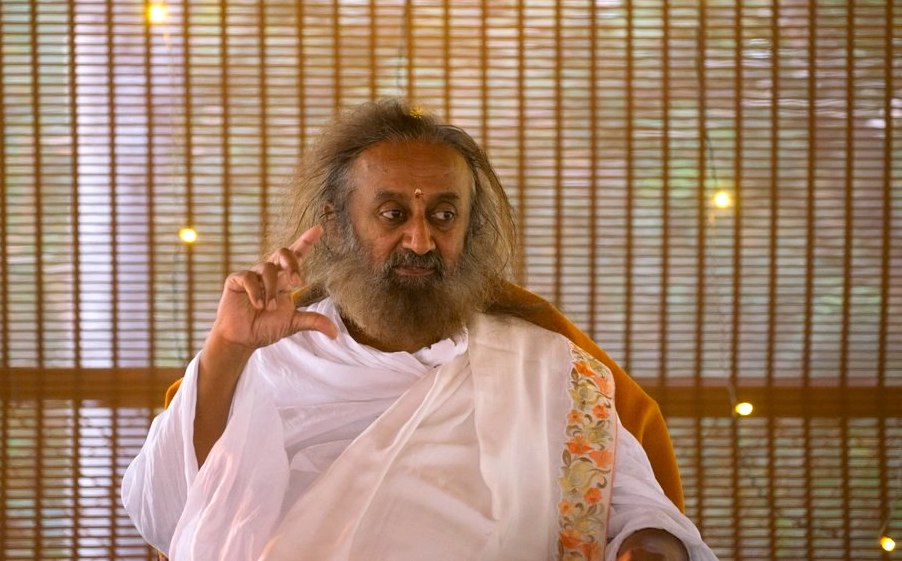November 19, 2021
Bengaluru, India
“The Future of Education” was an insightful conversation between a group of educationists and teachers from India with Gurudev Sri Sri Ravi Shankar.
Life is holistic, multidisciplinary, but most of the education is apparently done in silos today. However, children by nature are multi-talented, multi-disciplinary. It just calls for them to be provided with the right opportunity and a congenial atmosphere for them to be able to exhibit their innate potential, in any of the fields – be it sports, martial arts, academics, music or dance.
[bctt tweet=”Nature has already provided all types of skill in every human. It just needs a little nurturing.” username=”SriSri”]
Nurturing happens at two levels – wherein, parents instill a sense of responsibility in their children and secondly in school. It may seem easy to groom those who already are brilliant and excel in whatever they do. But the challenge of an educator lies in their willingness to be ready to take the risk of grooming one of those backbenchers and encourage those kids to come up. Educators and teachers just need to make sure that there is no groupism amongst students.
Despite the advent of technology, we still live in a world where philosophies are many, Knowledge prevalent. But it is people who move people; when they get inspired by role models, progress naturally happens.
When we see our young minds rooted in the knowledge of our ancient civilization, we will see a significant transformation; because it is in our roots that our strength remains. Teachers and educationists should pay a little more attention to these aspects. We also need to educate our people to respect every culture like our own. This broad mindset of “Udhara charitanam thu vasudhaiva kutumbakam” needs to be nurtured.
Such collective well-being enhances the broadmindedness in our children, in our society and mankind as a whole. One must learn to rejoice in other’s victory too.
In life, either you win, or you make others win. Either ways, life is a celebration.
Holistic Wellbeing to hone a Multi-talented younger generation
- Institutions should aim for the education of holistic well-being at the grass root level.
- Students and people specifically in the rural areas should be made aware of the knowledge of nutrition, holistic diet and health. This education is very pertinent today.
- Multi-talents have to be inculcated at a very early stage; Communication skills to be made essential.
- Emotional well-being should be strengthened through yoga, pranayama and meditation.
- Attitude and behavior play a huge role – children and youth as individuals should be sensitive towards themselves and others. They should be made to know that aggressiveness is in no way heroic.
Every skill, talent is kind of interconnected. Science can be taught artistically and arts can be taught scientifically. Spirituality helps bridge the gap. The world famous nuclear scientist Dr. APJ Abdul kalam was a great Veena player; and the great musician Dr. Balamurali Krishna was a lyricist too. These were great minds who were spiritually inclined. There have been greatest of technocrats who have had absolute passion for spirituality.
[bctt tweet=”Meditation helps declutter our mind, defog our awareness and makes us more present; wherein our perception, observation, innovation and expression starts blossoming.” username=”SriSri”]
Empower your child
The metamorphosis from a caterpillar to a butterfly is a beautiful process as children grow up. That is the time one should encourage their levels of confidence and not try to subdue what is sometimes looked at as ego. Like the membrane of the seed which protects a seed until it sprouts and becomes a plant, some sense of Self is necessary. What is important is to make sure that the ego is Sattvic.
Sattvic tendencies helps one to take on challenges and draw more energy from themselves. Hence, we must make sure that they remain sattvic and couple their ego with compassion.
The Bhagavad Gita should be taught to people of all age groups, not as a religious scripture, but as a learning for life. It clearly articulates the tendencies of the mind, as Sattvic-Rajasic-Tamasic. Likewise, Ayurveda speaks of the attitude and behavior of an individual based on their innate Prakruthi – Vata, Pitta, Kapha. While a child of Pitta type can absorb everything quickly, those who are of Kapha type may tend to be a bit slow. The tendency of Vata is instability and a bit wavery.
The nature and tendencies of an individual needs to be observed and corrected through specific activities and diet. All these are enshrined in our ancient scriptures, a tremendous wealth of knowledge which would help children excel in all facets of life.
When the roots are strong, and a good communication line established between the tutor and the taught, progress happens in the right direction. In ancient India, the Gurus, Acharyas were psychologists, sociologists, reformers and innovators themselves. But today, there is so much compartmentalization. We could bring them all together, and make it a source of inspiration to the younger generation.
[bctt tweet=”When inspired to have a Holistic Vision and Mission in life, one can do wonders. True spirituality is something that uplifts the spirit and makes one complete!” username=”SriSri”]

